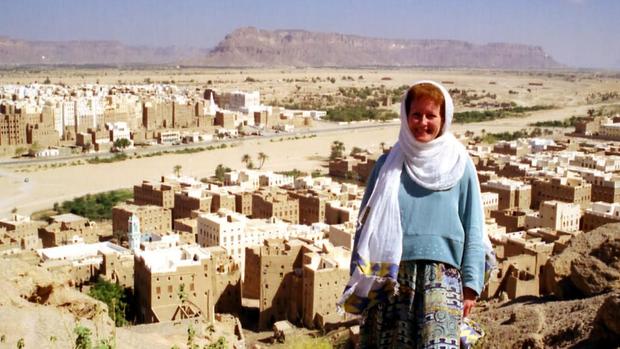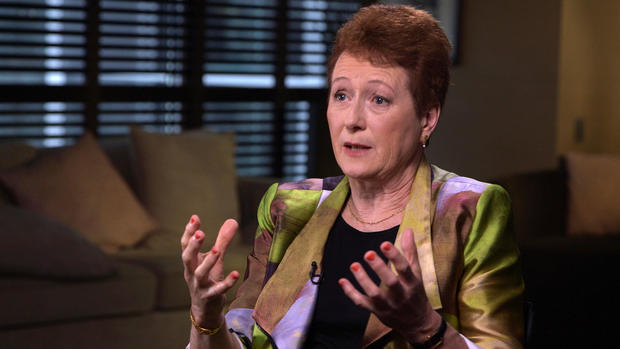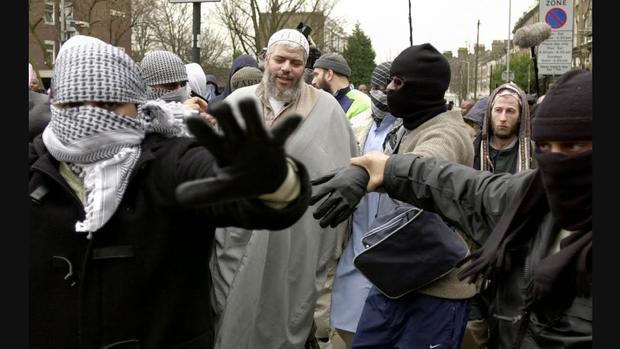Don't Mess with Mary Quin
The following is a script from “Don’t Mess with Mary Quin” which aired on Oct. 2, 2016. Bill Whitaker is the correspondent. Robert Anderson and Aaron Weisz, producers.
Mary Quin is an unlikely hero. Diminutive, and middle-aged, she was a top executive at Xerox in New York. A dual citizen of the U.S. and her native New Zealand, who liked adventure travel. But when she joined a tour in Yemen, back in 1998, her group got kidnapped. Four of her fellow tourists were killed. How Mary Quin survived is a story in itself, and so is what she did after the kidnapping. She got a prominent Muslim cleric, Abu Hamza, sentenced to life in prison for his role in her abduction. Abu Hamza learned the hard way that you don’t mess with Mary Quin. The kidnapping began as her tour group drove through the Yemeni desert. A pickup truck full of gunmen, swerved onto the road, forcing her convoy to stop.
Mary Quin: Right away, we knew this was—looked like we were going to be taken hostage, this was a kidnapping.
Bill Whitaker: How many kidnappers were there?
Mary Quin: About 18.
Bill Whitaker: Were they rough with you?
Mary Quin: Yeah. One of the drivers was struck in the face, ‘cause I saw blood.
Bill Whitaker: What are you thinking?
Mary Quin: It really felt like you were in a movie. It has that surreal quality that—is this really happening?
Much of Yemen is surreal. The tour group had explored breathtaking scenery and unique historic sites, but now they were hostages, and some would not survive.
Quin’s companions, mostly Brits, included teachers and managers. Quin, was a high-level executive at Xerox in New York. The gunmen were Yemeni rebels -- an offshoot of al Qaeda. They drove their captives off the main road into the desert, and made them sleep outside that night. The next morning, all hell broke loose.
Mary Quin: We started to hear gunfire in the distance. And right away, I thought, “Someone’s coming in to rescue us.” And there were shells exploding in the air above us and it was quite chaotic. And then, they just told us to stand in a line. And that’s when I thought we’re going to be executed.
Bill Whitaker: Stand in a line—
Mary Quin: Yeah, just had us line up, and I thought, well…(hand gesture.)
Quin and the other hostages said they were forced to be human shields. While the Yemeni army fired toward the terrorists from a thicket at the far end of a vacant field; at the opposite end, the terrorists made the tourists stand on a two-foot dirt wall. Then the kidnappers hid behind that berm shooting at the army through the hostages’ legs.
Mary Quin: They made us keep our arms in the air. But you can’t hold your arms up in the air for 45 minutes, so we’d hold up one arm and then the other.
Bill Whitaker: You feel the bullets whizzing by?
Mary Quin: Yeah, there was a moment where I could feel the air move on my cheek. They make this zinging sound. And I remember thinking, “This has gone on longer than the opening scene of Saving Private Ryan.”
Bill Whitaker: But this isn’t a movie.
Mary Quin: No. I found I was reminding myself, “You could be dead any second. How long is it going to be before one or more of us gets hit by one of these bullets?” I mean, it just seemed inevitable.
Bill Whitaker: You were convincing yourself minute-by-minute to stay alive.
Mary Quin: Yes. I had this quite a strong feeling that I would survive this. And I also had this feeling that I was going to be really annoyed if I got killed and didn’t get to see how it ended. So, the mechanism I used was just to say, “Do it one minute at a time.” And so I’d actually say that to myself, “Stay alive one more minute, stay alive one more minute.”
The terrorist right behind Quin was especially menacing. He wore a purple wraparound, so she called him, “Purple Skirt.”
Mary Quin: And then, Purple pushes me forward. With his AK-47, pushed against my back.
Bill Whitaker: Right against your back?
Mary Quin: Yeah, right on my spine. But I also remember thinking, “Just move that gun a centimeter.” ‘Cause I just had this vision of my, the bones in my spine just shattering into a thousand pieces.
Bill Whitaker: You’d gotten to that point where you’re thinking “I am going to die.”
Mary Quin: Yeah.
She had no idea why he was pushing her forward. But as they reach the middle of the field, Purple Skirt is shot.
Mary Quin: And he’s lying on the ground. Still a lot of gunfire in both directions, so I’m still a sitting duck out there in the middle of this field. And then I take two or three steps toward the Yemen army and I suddenly think, “Oh Purple Skirt was trying to get up on his elbow and his AK-47 is on the ground in front of him. I better take his gun, because he might shoot me as I’m running.” Because I-- I sort of thought how in all those movie scenes where you think you’ve dispatched the bad guy, and then when you’re not paying attention, he gets off one last shot. So that’s what I think of.
Bill Whitaker: You had taken some steps away--
Mary Quin: I had taken two or three steps away, I turn around, I come back and think, “I better take the gun so he can’t use it.” So I reach down and grab the barrel, which was closest towards me. And he grabs the stock. And so, now we are literally having a tug of war over an AK-47. And he’s screaming at me and I’m screaming at him--
Bill Whitaker: And bullets are still whizzing by?
Mary Quin: And bullets still going in all directions. So I just took another step closer to him and put my foot down on his head and that just gave me some leverage.
Bill Whitaker: So you wrestled the gun away from him?
Mary Quin: Yes, and said some things that we won’t repeat on television.
Bill Whitaker: What did you say?
Mary Quin: No, I won’t repeat it. And-- but it was casting aspersions on his mother, I’ll put it that way. So-- she’s probably a very lovely woman. But I just kept running, anyway.
Bill Whitaker: Holding onto the gun?
Mary Quin: Running with the gun and thinking, “I probably shouldn’t-- whoever’s there in the trees, running at them with a gun might not be a good move,” so I think I should toss it aside. But I said, “No, it’s such a souvenir, I wanna take it back.” And I thought, “Oh, U.S. Customs will never let me through with this.”
Bill Whitaker: All of this is going through your mind--
Mary Quin: It’s amaz-- you would never-- you would never guess what you think about in a situation like that. But I threw the gun aside, went up and over the last berm, into the bushes, and I could see three soldiers sitting in the bushes not far from me. And one of them sort of gave me a thumbs up
Bill Whitaker: When you wrestled the AK-47 away from Purple Skirt, did you think of shooting him?
Mary Quin: I did.
Bill Whitaker: You did?
Mary Quin: Yes. Definitely.
Bill Whitaker: Why didn’t you?
Mary Quin: I had never held a rifle. And it’s going to take me too long vital seconds standing out here figuring out how to use it.
Bill Whitaker: Did you feel angry enough that you could have shot him?
Mary Quin: Yes. And enjoyed it. And that was scary to me when I thought about it afterwards, it’s like, you find another person inside you that you kinda didn’t know was there
Bill Whitaker: In all, four of your tour group were killed there?
Mary Quin: Yes out of the 16 taken hostage, four shot dead and two seriously wounded.
Quin told us a terrorist executed one of the hostages. The other three died in the crossfire. The Yemeni army, killed three of the kidnappers including Purple Skirt. After 26 hours as captives, a military helicopter flew the surviving tourists -- and the dead -- to the city of Aden. Later, Quin spent months obsessed with the kidnapping.
Bill Whitaker: You had a whiteboard and you had names and arrows and circles and---
Mary Quin: I wouldn’t be at the ending until I kind of pieced together who was involved and why.
Quin read everything she could about the terrorists’ trial. Four had been captured, and convicted. Their leader was executed. Quin learned about a connection between the defendants.
[Abu Hamza: We shall show the whole entire world.]
And a radical British cleric, Abu Hamza, whose hands had been blown off in an explosion.
Mary Quin discovered that Abu Hamza, in London, had been on the phone with the chief kidnapper in Yemen, during the kidnapping. Their top demand was to get terrorists -- including Abu Hamza’s stepson -- released from a Yemeni prison. To learn more, Quin flew to London; waited, alone, outside Abu Hamza’s mosque and approached him as he arrived for Friday prayers.
Mary Quin: I went right up to him and said, “Look, I’ve come a long way just to talk to you. Can you give me 15 minutes, sometime over the weekend?” And no, no, he didn’t have time--.
Bill Whitaker: It’s quite bold of you.
Mary Quin: Yeah, well I wasn’t going to back off. So I said, “Please can I come back and talk to you when it’s convenient?” And he said, “Well, come back Sunday night.”
Bill Whitaker: Were you surprised?
Mary Quin: Yes. So I came back two days later. I was taken into his office and ended up talking to him for an hour.
Bill Whitaker: How did you start the conversation?
Mary Quin: I said to him, “I’m Mary Quin and I was one of the hostages taken by Abu Hassan in Yemen.”
Bill Whitaker: What did he say?
Mary Quin: He sort of leaned back in his chair and looked at me and said, “I am very surprised that you would come here.” So I had a little micro-cassette recorder and I said, “Would it be OK if I record the conversation?” He said, “Sure.” So I put the tape recorder right on his desk and between us.
Bill Whitaker: He had no concerns about your tape recorder?
Mary Quin: No, none at all.
Bill Whitaker: What did he say?
Mary Quin: Well, he clarified his connection with Abu Hassan, leader of the kidnapping group. That he knew him. That he had had phone calls with him.
Bill Whitaker: He admitted this?
Mary Quin: Oh, yes. He said that he had never intended for hostages to be killed and in fact, one-- sort of his most-telling comments was, “We never, we never expected it to get this bad.” And so, the implication being that he had been part of the planning of the hostage taking.
On Quin’s tape, Hamza also says the head kidnapper wants, quote, “To hold people ransom until the government let my people go. And then he would let you people go.”
Abu Hamza: Let you people go.
Bill Whitaker: It was clear that he knew that the kidnapping was going on?
Mary Quin: Oh, yes. I mean, there was no no doubt about that.
Bill Whitaker: Mary, how did the FBI learn that you had this tape recording of Abu Hamza?
Mary Quin: I had stayed in touch with the FBI agent who had come out to Yemen right after the kidnapping. So mentioned to him that I had managed to meet Abu Hamza. And so he was like, “Really?” And it’s on tape, I recorded it.” And he says, “Really?”
Mary Quin gave the FBI a copy and the U.S. began a lengthy effort to get Abu Hamza extradited. Finally, 13 years after the kidnapping Abu Hamza was flown to New York to stand trial. Quin testified against him, and prosecutors played her tape for the jury.
[Mary Quin: “Do you think that the decision to kidnap some foreigners was a good thing to do?
Abu Hamza: “Islamically, it’s a good thing to do.”]
Bill Whitaker: Did you ever imagine that your recording of your interview with Abu Hamza would end up being evidence in U.S. federal court?
Mary Quin: Not -- not in a million years would that thought have occurred to me.
Bill Whitaker: I bet it didn’t occur to Abu Hamza either.
The prosecutor called Quin’s tape, “devastating evidence of the defendant’s guilt.” The jury convicted him of kidnapping, and also of trying to set up a terrorist training camp in the U.S. Last year, Abu Hamza was sentenced to life in prison. Quin felt the murdered friends she’d made on the tour, had finally gotten justice. Now she could put it behind her.
Mary Quin: It was a sense of relief that it was over.
Bill Whitaker: So what have you learned from all this? What, what’s the moral to this story?
Mary Quin: The moral first struck me as we were being air lifted away. And the bodies that were murdered were wrapped in blankets and laid on the ground on the floor of the helicopter. And Ruth who, the Scottish woman who was killed, her shoes, her feet were poking out the end of the blanket and they were just a few inches away from my feet and I remember looking at her shoes and looking at mine and thinking how easy it would have been that those were my shoes—
Bill Whitaker: You could have been under the blanket?
Mary Quin: Under that blanket. And how it was just for the complete randomness of where the two of us were standing that she was dead and I wasn’t.



